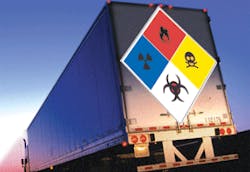Railroad giant CSX Transportation’s (CSXT) motion to invalidate an emergency act prohibiting ultra-hazardous materials within a 2.2-mi. radius around Capitol Hill has been denied by U.S. District Court for the District of Columbia Judge Emmet Sullivan.
If Judge Sullivan’s decision survives a CSXT appeal, it will set a precedent for truck transportation, said Rick Schweitzer, National Private Truck Council’s general counsel & government affairs.
“It’s to my understanding that the city councils of Baltimore, Philadelphia, and Pittsburgh are considering rail bans similar to D.C.,” Schweitzer told Fleet Owner.
“This case involves longstanding principles of federalism applied to one of the government’s newest and most important roles—protecting our nation from the threat of terrorism,” Sullivan wrote. “At issue is a simple, but potentially devastating scenario: the deliberate targeting and destruction of a railroad car containing chlorine gas or other ultra-hazardous material in the heart of Washington D.C.”
The judge sided with the D.C. Council, the local government which proposed the emergency act, in that it has the right to implement temporary restrictions until Congress addresses such threats.
“Thus, the case is not about whether the D.C. Council has unconditional authority to choose whether or not hazardous materials may enter the District; it clearly does not,” Sullivan said. “Rather, this case presents the much narrower and fact-specific question of whether the District of Columbia, pursuant to its traditional police powers and on a temporary basis, may prohibit the rail carriage of certain hazardous through the District until the federal government has more thoroughly addressed the threat of terrorist attack on trains and put sufficient safeguards in place.”
D.C. Councilmember Kathy Patterson applauded the decision, citing the inadequacies of the current measures in place.
“I see the judge’s ruling as an invitation for the U.S. Dept. of Justice (DOJ), Homeland Security (DHS) and Transportation (DOT) to put aside their ideas of adding hidden cameras and dummy rail cars, and to step forward with meaningful security measures, which clearly include rerouting out of high-density areas,” Patterson said. “I look forward to working with the Bush Administration and the U.S. Congress on this national issue of hazmat transportation safety.”
CSXT vows to file an appeal to the U.S. Court of Appeals for the District of Columbia Circuit “as quickly as possible,” noting that the ruling goes against the legal opinions of DOJ, DHS and DOT. Additionally, CSXT is expected to ask the appeals court to temporarily bar the emergency act, which is slated to go into effect tomorrow.
“CSXT believes that if left unchallenged, the District’s law could establish a precedent that could lead to a patchwork of similar laws that could virtually shut down rail transportation of critical commodities in the U.S.,” CSXT stated.
“I think the decision was surprising and ultimately will be overturned. The preemption authority in the Hazardous Materials Transportation Act, the Federal Rail Act and the commerce clauses of the constitution are based on the idea that state and local governments couldn’t impede or disrupt the flow of interstate commerce,” says NPTC’s Schweitzer. “It’s a tremendous balancing act— you need to balance the citizen’s right for security and the commercial needs of railroads.”
